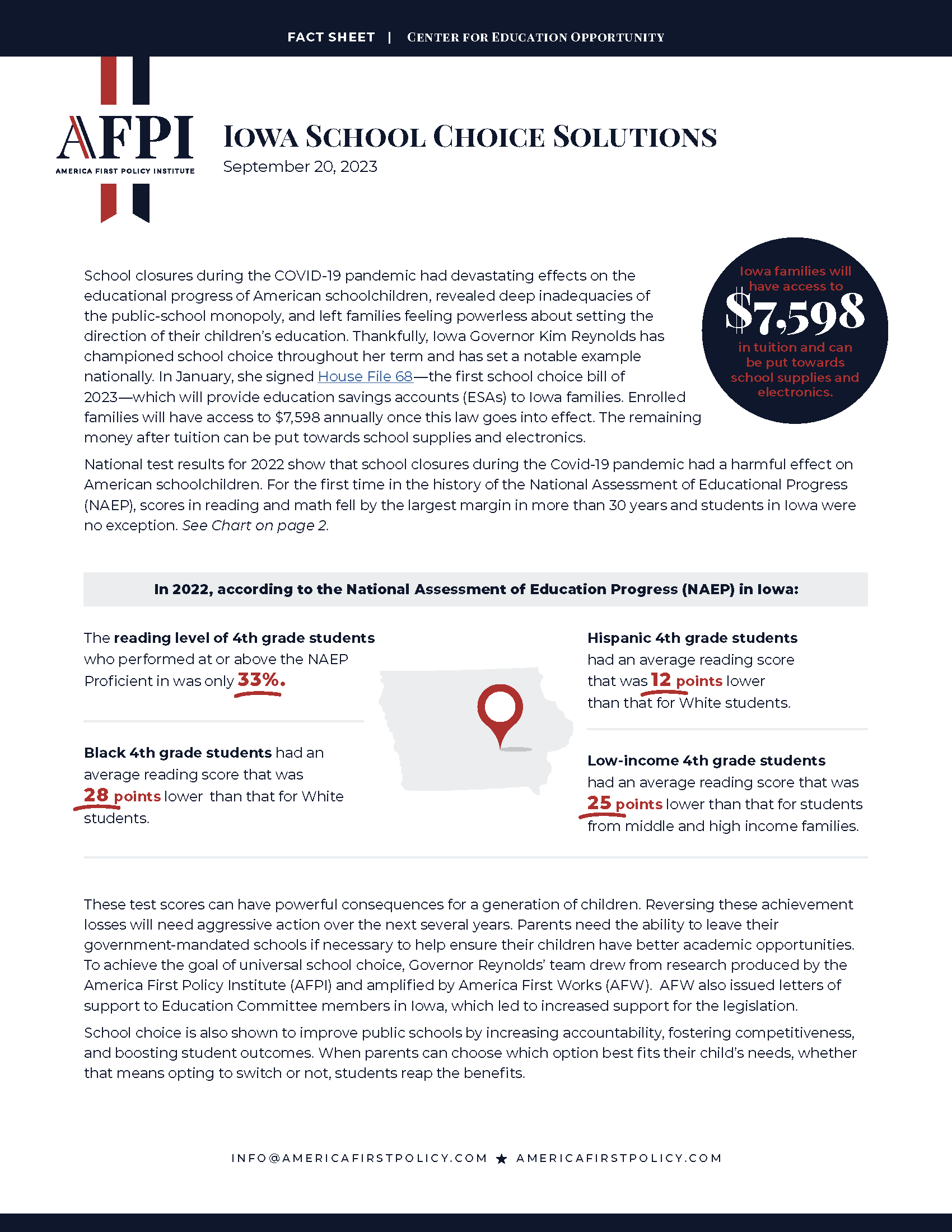Iowa School Choice Solutions
School closures during the COVID-19 pandemic had devastating effects on the educational progress of American schoolchildren, revealed deep inadequacies of the public-school monopoly, and left families feeling powerless about setting the direction of their children’s education. Thankfully, Iowa Governor Kim Reynolds has championed school choice throughout her term and has set a notable example nationally. In January, she signed House File 68—the first school choice bill of 2023—which will provide education savings accounts (ESAs) to Iowa families. Enrolled families will have access to $7,598 annually once this law goes into effect. The remaining money after tuition can be put towards school supplies and electronics.
National test results for 2022 show that school closures during the Covid-19 pandemic had a harmful effect on American schoolchildren. For the first time in the history of the National Assessment of Educational Progress (NAEP), scores in reading and math fell by the largest margin in more than 30 years and students in Iowa were no exception. See Chart on page 2.
Iowa families will have access to $7,598 in tuition and can be put towards school supplies and electronics.
In 2022, according to the National Assessment of Education Progress (NAEP) in Iowa:
- The reading level of 4th grade students who performed at or above the NAEP Proficient in was only 33%.
- Black 4th grade students had an average reading score that was 28 points lower than that for White students.
- Hispanic 4th grade students had an average reading score that was 12 points lower than that for White students.
- Low-income 4th grade students had an average reading score that was 25 points lower than that for students from middle and high income families.
These test scores can have powerful consequences for a generation of children. Reversing these achievement losses will need aggressive action over the next several years. Parents need the ability to leave their government-mandated schools if necessary to help ensure their children have better academic opportunities.To achieve the goal of universal school choice, Governor Reynolds’ team drew from research produced by the America First Policy Institute (AFPI) and amplified by America First Works (AFW). AFW also issued letters of support to Education Committee members in Iowa, which led to increased support for the legislation.
School choice is also shown to improve public schools by increasing accountability, fostering competitiveness, and boosting student outcomes. When parents can choose which option best fits their child’s needs, whether that means opting to switch or not, students reap the benefits.
Beginning in early 2022, AFPI and AFW started working to expand school choice in the state by hosting a School Choice Speaker Series to celebrate National School Choice Week. This event featured Scott Turner, AFPI Chair of the Center for Education Opportunity, Kellyanne Conway, AFPI Chair of the Center for the American Child, and Brooke Rollins, AFPI President and CEO. After launching the coalition, AFPI produced more than 20 research papers and five national opinion articles and participated in over ten national media events. As a result, state legislatures introduced 74 measures to create or expand school choice voucher programs. In addition, AFPI provided school choice model legislation in seven priority states.
Iowa is a stellar example of school choice success. Families and students are thriving, empowered to meet their full potential in a school-setting that supports and validates their individual learning needs.
School choice is representative of two core American values—freedom and opportunity. At AFPI, we believe that the purpose of education is to prepare Americans for the rights and responsibilities of citizenship. As public support for school choice continues to grow, students across the nation will have access to schooling that meets individualized needs, and educational outcomes will improve. Most importantly, parents will be empowered to have a stronger voice in the conversation about their child’s schooling. While the Biden administration tries to stall progress on school choice policies, the Center for Education Opportunity remains highly committed to the school choice mission.
